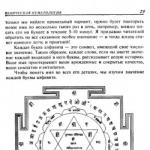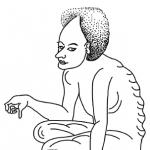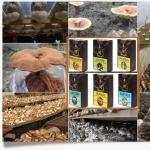Interesting tasks for development. Exercises for the development of logical thinking in preschoolers
These exercises are aimed at developing logical thinking senior preschoolers and younger students.
"Cross out the unnecessary"
For this lesson, you will need flashcards with rows of 4-5 words or numbers.
The child, having read the row, must determine what common feature unites most of the words or numbers in the row, and find one superfluous. Then he must explain his choice.
Option 1
The words are combined in meaning.
Pan Pan, ball, plate.
A pen, doll, notebook, ruler.
Shirt, shoes, sweater dress.
Chair, sofa, stool, cupboard.
Happy, brave, joyful, happy.
Red Green, dark, blue, orange.
Bus, wheel, trolleybus, tram, bicycle.
Option 2
Words are united not by meaning, but by formal features (for example, they begin with one letter, with a vowel, there is the same prefix, the same number of syllables, one part of speech, etc.). When compiling such a series, you need to ensure that only one sign coincides. Exercise requires high level development of attention.
Phone, fog, port, tourist. (Three words begin with the letter "T".)
April, play, teacher, snow, rain. (Four words end with "b".)
Wall, paste, notebook, legs, arrows. (In four words, the stress falls on the first syllable.)
Drawing, strength, wind, life, minute. (In four words, the second letter is "I".)
Option 3
16, 25, 73, 34 (73 is superfluous, the rest have 7 digits)
5, 8, 10, 15 (8 is superfluous, the rest are divisible by 5)
64, 75, 86, 72 (72 is superfluous, the rest have a difference of 2)
87, 65, 53, 32 (53 is superfluous, the rest have the first digit more than the second by 1)
3, 7, 11, 14 (14 is superfluous, the rest are odd)
"Invisible Words"
For the lesson, you will need to type words in which letters are mixed.
For example, there was the word "book", now - "nkagi". This evil sorceress got angry and made all words invisible. It is necessary to return each word to its previous, correct, form. Completing the task requires a high concentration of attention. During the exercise, the ability to analyze the material is trained.
Option 1
Restore the correct order of letters in words.
Dubrzha, kluka, balnok, leon, rutting, sug.
Selnots, imza, chenite, tarm, myase.
Pmisio, croilk, bubaksha, stovefor, bomeget.
Kovora, kirutsa, shakok, sakoba.
Option 2
To make it more interesting for the child to complete the task, you can group the words into columns so that after decoding the first letters of the correctly spelled words will also form a word.
Correctly write the invisible words and read the new food, consisting of the first letters of the decoded words.
Answer: hello.
Answer: a lesson.
Answer: cinema.
Answer: a gift.
Option 3
Restore the correct order of letters in words and find among them one that is superfluous in meaning.
1. Here are invisible animals, but one word is superfluous (perch).
Yazats, devmed, blake, nokyu, lvok.
2. Here are invisible flowers, but one word is superfluous (birch).
Pewaltn, zora, bzerea, snarsits, lydnash.
3. There are invisible trees, but one word is superfluous (acorn).
Oinsa, bdu, swindler, not.
Option 4
Find another word in one word by rearranging the letters.
1. Find invisible animals by swapping letters in words.
Strength, salt, can, peony.
2. Find the invisibility game in the word.
3. Find the invisible tree in the word.
4. Find a piece of invisible clothing in the word.
5. Find the invisible flower in the word.
Option 5
There are many invisible words hidden in one word. For example, in the word "word" itself, several words are hidden: hair, solo, ox and catch. Try to find as many invisible words as possible in words:
keyboard
parents
"Another letter"
In this exercise, riddles and tasks are given, according to the conditions of which, by replacing one letter in a word, you can get a new word. The number of letters in words cannot be changed. For example: oak - tooth, sleep - catfish, steam - feast.
Option 1
Guess riddles.
They can put us at school,
If we don't know anything.
Well, if with the letter "T",
Then he will meow to you. (count - cat)
Anyone will walk on it.
With the letter "P" - from the forehead it pours. (half - sweat)
If "K" - the hostess is crying.
If "G" - the horse jumps. (bow - meadow)
With "R" - she is acting,
With "C" - everyone needs it in the kitchen. (role - salt)
With the letter "D" - the entrance to the apartment,
With the letter "3" - lives in the forest. (the door is a beast)
With "D" - mom dresses up in a dress,
With "H" - at this time they fall asleep. (daughter - night)
With "L" - the goalkeeper did not help,
With "D" - we change the calendar. (goal - year)
With the letter "K" - it is in the swamp,
With "P" - on the tree you will find. (bump - kidney)
With "T" - he is on fire with food,
With "3" - with horns, with a beard. (boiler - goat)
With "R" - and hide and seek, and football.
With "L" - she is given an injection. (game is a needle)
Option 2
Words with one missing letter are given. Form as many words as possible, substituting one letter at a time for the gaps, as in the sample.
Sample: ... ol - role, salt, moth, pain, zero.
Option 3
Get from one word to another through a chain of words by replacing one letter at each step. For example, how to get the word “goal” from the word “smoke”? Several transformations need to be done: smoke - house - com - count - goal. Only nouns can be used in the chain, only one letter changes each time. By doing this exercise, the child learns to analyze and predict the result. It is advisable to achieve the goal in the least number of moves, that is, the one with the shorter chain wins.
Get the word “steam” from the word “moment”, from the word “cheese” the word “mouth”, from the word “house” the word “ball”, from the word “moment” the word “hour”.
"Houses"
Completing math assignments forms logical thinking. We offer the game "Houses", the content of which may become more complicated depending on the level of knowledge of the child.
Option 1
Place one of the signs of mathematical actions in the free window of the house so that you get the number on the roof.
Option 2
Place one of the signs of mathematical actions in the free windows of the house to get the number on the roof as a result. Several solutions are possible in these tasks.
Exercises to develop intellectual abilities
Development of thinking, logic, memory, attention, observation, perception, verbal and non-verbal intelligence. Burime, limericks, riddles as a means of intellectual development. Are given logical tasks, questions on the development of logic. Warm-up exercise in a group training procedure. Group psychological training procedure. Participants play a game as if they are "thoughtholics" and want to be cured of it. Group psychological training procedure. Participants are briefly shown a table with 25 letters, then from memory they should make up words from these letters. Group psychological training procedure. Participants find analogies in unrelated things. The exercise is aimed at developing wit and intelligence in general. Exercise will help to reveal intellectual abilities, actualize hidden potential and develop wit. Developing the ability and habit to compare different kinds of objects and phenomena with each other. The exercise will allow you to develop your intellect somewhat by increasing the objective power of thought. The exercise is intended for individual use. It will help you learn to compose a verbal portrait, quickly memorize appearance other people, their characteristics. Develops visual memory. It is not at all easy to think without obscenities. But it is necessary if there is a desire to increase your intelligence. Group psychological training procedure. Aimed at revealing intellectual abilities. Group psychological training procedure. Participants memorize various poses. Group psychological training procedure. Participants come up with hieroglyphs, write down their thoughts with them. Group psychological training procedure. Participants are looking for an extra four-digit number. Group psychological training procedure. Aimed at the development of observation and visual memory. Exercise will help to increase your intellectual level by developing combinatorial abilities. It never hurts to look at the world through the eyes of a fool: on the one hand, this will increase your respect for your own intellect, for your achievements in the intellectual field, and on the other hand, it can help expand your worldview, find new, useful truths in a wide variety of areas of knowledge! Group psychological training procedure. Participants train in abstraction-concretization. An exercise in the development of observation, the ability to quickly assess the personal qualities of other people. The exercise is designed to develop conceptual thinking and intelligence in general. Group psychological training procedure. Participants try to memorize the algorithm for performing actions with numbers. Group psychological training procedure. Participants offer many interpretations of the same story. A little exercise can be very effective in developing flexibility in your thinking. The exercise will help develop intellectual abilities through the disclosure of analytical skills. The exercise develops observation, intellectual abilities. Group psychological training procedure. It can be used both in intelligence trainings and as an intellectual warm-up for other trainings. Participants pick up rhymes. The exercise will help develop observation, the ability to understand people, understand their problems. Group psychological training procedure. Each participant receives a secret instruction on how to behave; others have to guess. The exercise is aimed at developing observation. A well-known exercise aimed at developing intellectual flexibility. Group psychological training procedure. Participants solve anagrams: not only letters are mixed up, but also words. Group psychological training procedure. The exercise is aimed at revealing intellectual abilities, developing the ability to understand people. The procedure of group psychological training aimed at the development of intellectual abilities. Develops the ability to think logically, reasonably. Group psychological training procedure. Participants come up with superpowers. The exercise is aimed at developing fluency in thinking. Group intellectual training procedure. Participants draw various amusing conclusions from the given axiom that "everything is relative." A procedure for group or individual intellectual training. Participants put things in order in the words of proverbs. Group psychological training procedure. Participants compete among themselves - who will come up with the longest hiatus (a sequence of vowels in a meaningful sentence). Group psychological training procedure. Participants imagine themselves as chess pieces. A group psychological training procedure aimed at developing intellectual abilities. Well suited for the liberation of the group, the acquaintance of the participants with each other (for the beginning of the training). It is necessary to leave only those words that denote something similar in some way, and exclude one word "superfluous" that does not possess this feature. Group psychological training procedure. Participants are divided into 2-3 teams, they collectively count in their heads. Intellectual emancipation. Exercises aimed at developing memory through expanding the volume of memory, mastering special techniques of memorization and recall. A somewhat exercise for the development of memory in adolescents. The development of volatility of attention, as well as individual characteristics of attention. Development of imagination, fantasy. Development of analytical and combinatorial abilities. It will not be superfluous for anyone to develop their imagination. A good imagination allows our memory to work better and more efficiently, and is also reliable support our thinking, allowing us to operate with complex images. One way to develop your imagination is through poetry. Change of habitual temporary connections. Changing habitual spatial relationships. Changing the familiar ties of the community. Several games to develop visual memory. The main thing in the development of visual-figurative thinking is to teach how to create new images, to liberate imagination. This exercise, or rather a cycle of exercises, is designed to develop speed reading skills. Several games to develop tactile memory. Several word games. Development of verbal intelligence. Development of verbal intelligence. This technique will help in the development of original ideas, unexpected solutions to the problem. Designed for uncertain situations in which everything is not clear possible ways solving the problem. Exercises aimed at developing quality perception. Development of verbal intelligence. Mastering the mnemonic technique. Development of attention and memory in the process of group training. The exercise is designed to develop memory, verbal intelligence. The development of intelligence in group training. Development of verbal fluency. Formation of the ability to operate with words, accurately express thoughts. Verbal fluency. Development of verbal intelligence. Development of verbal intelligence. Development of conceptual thinking. The development of associative thinking. Development of an intuitive perception of the likelihood of events, tactical abilities. Development of verbal intelligence: restoring the order of words in proverbs. Development of concentration of attention. Development of concentration of attention. Development of conceptual thinking. Development of logical thinking. Group psychological training procedure. Participants come up with a verbal description of the monster. Development of concentration of attention, imagination. Development of verbal intelligence, imagination. Development of verbal fluency. It is necessary to generalize and limit the concepts. Development of conceptual thinking. Development of verbal fluency. Development of critical thinking, attention, feeling of language. Development of conceptual thinking. Development of attention, sense of language. Development of attention. Development of imagination. The task is aimed at the breadth of thinking, comprehensive analysis. Development of verbal intelligence. Development of verbal fluency. Development of verbal intelligence. Development of verbal fluency. Development of verbal intelligence. Development of verbal intelligence. Development of verbal intelligence. Intellectual emancipation. Development of logical thinking. Formation of an attitude towards a comprehensive analysis of the situation. The assignment disciplines and deepens thinking. Development of verbal fluency."Cross out the unnecessary"
For the lesson, you will need flashcards with rows of 4-5 words or numbers.
The child, having read the row, must determine what common feature unites most of the words or numbers in the row, and find one superfluous. Then he must explain his choice.
Option 1
The words are combined in meaning.
Pan Pan,ball , plate.
A pen,doll , notebook, ruler.
Shirt,shoes , sweater dress.
Chair, sofa, stool,cupboard.
Happy,brave , joyful, happy.
Red Green,dark , blue, orange.
Bus, wheel, trolleybus, tram, bicycle.
Option 2
Words are united not by meaning, but by formal features (for example, they begin with one letter, with a vowel, there is the same prefix, the same number of syllables, one part of speech, etc.). When compiling such a series, you need to ensure that only one sign coincides. The exercise requires a high level of attention development.
Phone, fog,port , tourist. (Three words begin with the letter "T".)
April, play, teacher,snow , rain. (Four words end with "b".)
Wall, paste,notebook , legs, arrows. (In four words, the stress falls on the first syllable.)
Drawing, strength, wind, life, minute. (In four words, the second letter is "I".)
Option 3
16, 25, 73, 34 (73 is superfluous, the rest have 7 digits)
5, 8, 10, 15 (8 is superfluous, the rest are divisible by 5)
64, 75, 86, 72 (72 is superfluous, the rest have a difference of 2)
87, 65, 53, 32 (53 is superfluous, the rest have the first digit more than the second by 1)
3, 7, 11, 14 (14 is superfluous, the rest are odd)
"Invisible Words"
For the lesson, you will need to type words in which letters are mixed.
For example, there was the word "book", now - "nkagi". This evil sorceress got angry and made all words invisible. It is necessary to return each word to its previous, correct, form. Completing the task requires a high concentration of attention. During the exercise, the ability to analyze the material is trained.
Option 1
Restore the correct order of letters in words.
Dubrzha, kluka, balnok, leon, rutting, sug.
Selnots, imza, chenite, tarm, myase.
Pmisio, croilk, bubaksha, stovefor, bomeget.
Kovora, kirutsa, shakok, sakoba.
Option 2
To make it more interesting for the child to complete the task, you can group the words into columns so that after decoding the first letters of the correctly spelled words will also form a word.
Correctly write the invisible words and read the new food, consisting of the first letters of the decoded words.
PTLAOC -
CHREKA -
GIRA-
INLET -
ADE-
BRUAT -
Answer: hello.
WOOD -
URVAK -
CHICO -
KSSLA -
Answer: a lesson.
CSOTMU -
LEWEY -
RELATED -
OKNEA -
Answer: cinema.
SEAT -
OVUB -
KODCHA -
AVSUTG-
BLACK -
OBADI -
HUKYAN -
Answer: a gift.
Option 3
Restore the correct order of letters in words and find among them one that is superfluous in meaning.
1. Here are invisible animals, but one word is superfluous (perch).
Yazats, devmed, blake, nokyu, lvok.
2. Here are invisible flowers, but one word is superfluous (birch).
Pewaltn, zora, bzerea, snarsits, lydnash.
3. There are invisible trees, but one word is superfluous (acorn).
Oinsa, bdu, swindler, not.
Option 4
Find another word in one word by rearranging the letters.
1. Find invisible animals by swapping letters in words.
Strength, salt, can, peony.
2. Find the invisibility game in the word.
Cone.
3. Find the invisible tree in the word.
Pump.
4. Find a piece of invisible clothing in the word.
Bast.
5. Find the invisible flower in the word.
Midge.
Option 5
There are many invisible words hidden in one word. For example, in the word "word" itself, several words are hidden: hair, solo, ox and catch. Try to find as many invisible words as possible in words:
pillow
keyboard
rocket
shop
present
parents
"Another letter"
In this exercise, riddles and tasks are given, according to the conditions of which, by replacing one letter in a word, you can get a new word. The number of letters in words cannot be changed. For example: oak - tooth, sleep - catfish, steam - feast.
Option 1
Guess riddles.
They can put us at school,
If we don't know anything.
Well, if with the letter "T",
Then he will meow to you.(count - cat)
Anyone will walk on it.
With the letter "P" - it pours from the forehead.(half - sweat)
If "K" - the hostess is crying.
If "G" - the horse jumps.(bow - meadow)
With "R" - she is acting,
With "C" - everyone needs it in the kitchen.(role - salt)
With the letter "D" - the entrance to the apartment,
With the letter "3" - lives in the forest.(the door is a beast)
With "D" - mom dresses up in a dress,
With "H" - at this time they fall asleep.(daughter - night)
With "L" - the goalkeeper did not help,
With "D" - we change the calendar. (goal - year)
With the letter "K" - it is in the swamp,
With "P" - on the tree you will find.(bump - kidney)
With "T" - he is on fire with food,
With "3" - with horns, with a beard.(boiler - goat)
With "R" - and hide and seek, and football.
With "L" - she is given an injection. (game is a needle)
Option 2
Words with one missing letter are given. Form as many words as possible, substituting one letter at a time for the gaps, as in the sample.
Sample: ... ol - role, salt, moth, pain, zero.
Ro ... -
Glasses -
Ba ... -
Ap -
Macaw -
Aika -
Yen -
Ohm -
Option 3
Get from one word to another through a chain of words by replacing one letter at each step. For example, how to get the word “goal” from the word “smoke”? Several transformations need to be done: smoke - house - com - count - goal. Only nouns can be used in the chain, only one letter changes each time. By doing this exercise, the child learns to analyze and predict the result. It is advisable to achieve the goal in the least number of moves, that is, the one with the shorter chain wins.
Get the word “steam” from the word “moment”, from the word “cheese” the word “mouth”, from the word “house” the word “ball”, from the word “moment” the word “hour”.
"Houses"
Completing math assignments forms logical thinking. We offer the game "Houses", the content of which may become more complicated depending on the level of knowledge of the child.
Option 1
Place one of the signs of mathematical actions in the free window of the house so that you get the number on the roof.
Option 2
Place one of the signs of mathematical actions in the free windows of the house to get the number on the roof as a result. Several solutions are possible in these tasks.
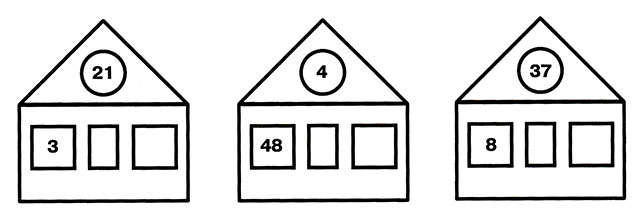
"Rebus"
We suggest that you teach children to solve puzzles. This lesson perfectly develops logical thinking, methods of analysis and synthesis. To learn how to solve puzzles, you need to familiarize yourself with the special rules for compiling them.
Basic rules for solving puzzles
1. A noun is thought of in the nominative case.
2. Parts of a word are sometimes depicted with pictures or symbols. They can be read in different ways. For example: 1 - one, count, one. You need to check all the options.
3. The commas before the picture or symbol indicate the number of letters to be dropped from the beginning of the word indicated by the picture or symbol. For example: ,☆ - reads like "riding".
4. The commas after the picture or symbol indicate the number of letters to be dropped from the end of the word indicated by the picture or symbol.
5. If equality is indicated above the figure, for example A = I, then the letter A must be replaced with I.
6. If the equality 2 = And is indicated, then the second letter in the word must be replaced with I.
7. Letters or pictures can be depicted inside other letters, above them, below them, behind them and on them. This is how the parts of the words "in", "above", "under", "for", "on" are denoted.
8. The numbers above the figures indicate a change in the order of the letters in the word.
Use the rules to solve the puzzles.
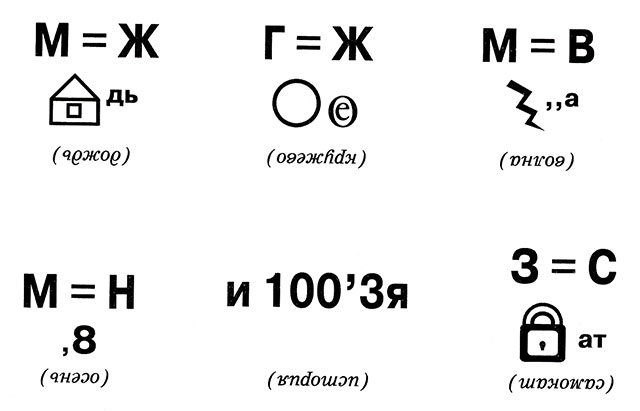
"Addition and Subtraction"
To develop the ability to think logically, we offer fascinating examples of addition and subtraction. These are special examples, in which not the usual numbers for a child are used, but words. With them, it is necessary to perform mathematical operations, having previously guessed the original word and writing the answers in parentheses. Here is a sample solution for such examples.
Addition
Given: boo + shade = unblown flower
Solution: boo + tone = bud
Subtraction
Given: mode of transport - o = unit of measurement Solution: metro - o = meter
Option 1
Replace the words in parentheses with the ones you need to get the correct equality using addition.
b + food = unhappiness
k + insect = girl's hairstyle
y + bad weather with rain = danger
y + country house = success
o + enemy = long pit
y + baby girl = angler's tackle
o + tool = edge of the forest
s + wool of animals = distributed during the fun
y + one = do to the patient
m + fish soup = insect
y + ball in goal = in triangle
for + country house = needs a solution
ka + reward = whim
o + settlement = plot of land
av + tomato = weapon
ba + shade = white bread
about + for scooping food = on a notebook and on a book
ku + for nails = hand with fingers pressed to the palms
ko + actor plays = monarch
po + misfortune = success in battle
at + pine forest = apparatus
at + battle = waves near the coast
Answers : trouble, scythe, threat, luck, ravine, fishing rod, edge, laughter, prick, fly, angle, task, whim, vegetable garden, machine gun, loaf, cover, fist, king, victory, device, surf.
Option 2
Replace the words in parentheses with the ones you need to get the correct equality using subtraction.
vessel - a = money is kept there
moralizing poem - nya = low voice
underwear - s = afraid of everything
tomato - at = separate book
shallow place in the river - b = they write on the blackboard
strong fear - great master = snake
bird - pronoun = criminal
military unit- k = we walk on it at home
male facial hair - solemn verse = pine forest
bird - oka = garbage
flower - s = game
fantasy - ta = knight's weapon
you can cook in it - ate = a pet
on the neck in winter - f = geometric figure
young plant - ok = human height
the goalkeeper stands in them - a = on the clothes around the neck
sport - c = right and left at the body
Answers: bank, bass, coward, tom, chalk, already, thief, floor, boron, litter, loto, sword, cat, ball, growth, gate, side.
"Next number"
The ability to compare and analyze is well developed when performing tasks in which it is required to identify a pattern. We suggest using a series of numbers for this. The child needs to find a pattern within a series of numbers and continue it following the same logic.
3, 5, 7, 9 .... (A row of odd numbers, the next number is 11.)
16, 22, 28, 34 .... (Each next number is 6 more than the previous one, the next number is 40.)
55, 48, 41, 34 .... (Each next number is 7 less than the previous one, the next number is 27.)
12, 21, 16, 61, 25 .... (In each pair of numbers, the numbers are interchanged, the next number is 52.)
"Definitions"
Each object or phenomenon has many signs, only we do not always notice them. When performing this task, the child must look at objects and phenomena from different angles.
The exercise can be performed individually or collectively as a competition.
Option 1
Come up with as many definitions as possible that characterize objects or phenomena. (The task trains the skills of analysis, since it is necessary to separate the parts from the whole.)
Snow - cold, fluffy, light, white, lacy, iridescent, thick, beautiful, etc.
River -
Firework -
Clouds -
Kitty -
Rainbow -
Option 2
Consider the listed definitions and guess the object or phenomenon that they characterize. (This option is more difficult, when performing synthesis skills are trained: it is necessary to combine all the signs and determine what subject they relate to. The hint is the gender of adjectives and participles.)
Gusty, hurricane, warm, piercing - wind.
Dark, quiet, moonlit, black - ... (night).
Long, asphalt, forest, broken - ... (road).
Kind, caring, beloved, beautiful - ... (mother).
Short, long, cropped, shiny - ... (hair).
Magic, interesting, folk, kind - ... (fairy tale).
Strong, fragrant, sweet, hot - ... (tea).
Hot, cheerful, long-awaited, sunny - ... (summer).
Devoted, shaggy, noisy, beloved - ... (dog).
Round, bright, yellow, hot - ... (sun).
"Confusion-2"
This exercise contains sentences in which some words are mixed up or replaced. In order to complete tasks, you need to use logical thinking.
Option 1
Due to unforeseen circumstances, one word disappeared from the sentence, and an inappropriate, random word took its place. Put things in order in every sentence: remove a random word and return the right word.
I slept this morning, I was in a hurry, but, unfortunately, I came to schoolearlier. (with delay)
I boughtloaf , presented it to the conductor and got on the train, (ticket)
It was hot outside, so Masha put onfur coat. (sundress)
On the roof of my grandmother's house there wasstick from which smoke came when the stove was fired. (pipe)
Whendawn , we began to look into the night sky, looking at the stars and the moon. (it got dark)
I like swimming on the beach and wallowing on asphalt.(sand)
Option 2
And in these sentences the words were reversed, and it became very difficult to understand what in question... Re-order the words in the sentences.
My friends played on the playground.
I got an A in Russian in my lesson.
It is interesting to observe fish for aquarium life.
I made all the gifts for my relatives.
It was quiet after a fresh and thunderstorm outside.
You can see the stars in the night in August in the falling sky.
"Assignments with text"
Prepare text passages for the exercise.
Completing assignments with texts perfectly develops logical thinking. In this exercise, we present several options for such tasks. They apply to any passages unfamiliar to the child. literary works(fairy tales, stories, etc.).
Option 1
Read the passage and have your child think of 5-7 headings for it. They should reflect the main content and be original. Encourage your child to use words from the text. If the exercise is performed by several people, then it can be carried out in the form of a competition.
Option 2
Read a 10-15 sentence passage and ask to convey its content in 2-3 sentences, that is, to make a short retelling. This exercise will form the child's ability to generalize material, highlight the main thing. Such tasks are useful for the development of logical thinking.
Option 3
Read the passage to your child, skipping the middle part, which the child should complete. The logical connection of the insert invented by the child with the beginning and end of the original text is assessed.
Option 4
Read the passage and have your child think of a continuation of the text. This task develops both imagination and logical thinking, since the content of the continuation must be justified by the previous events described in the passage.
"Pantomime"
This game perfectly develops logical thinking. What is pantomime? Pantomime is a performance with facial expressions and gestures, without words. The minimum number of participants is 5, one of them is the leader, the rest are divided into two teams. The facilitator makes words, monitors compliance with the rules and awards points for correct execution tasks. The teams take part in the game alternately.
The leader leaves with the member of the first team from the room in which the rest of the players are, and says the word. For example "bath". The player must use a pantomime to
give the given word to your team, whose members can ask questions. The demonstrator cannot answer, but can only nod his head or use other gestures. Its purpose is to show a given object or phenomenon in such a way that the team can quickly guess. The presenter can limit the time for pantomime. For each word guessed by the team, 1 point is awarded. Then the second team receives the task. The game can also be played with three participants, one of whom is the presenter. Then the points are not awarded, but the words are simply guessed.
All the exercises and games that are offered in this article will help children master the techniques of logical thinking, learn to think logically on practical material. The gradual complication of tasks allows you to develop logical thinking. This will help the child at school, make the process of mastering knowledge easier, more interesting and more successful.
Help your child by explaining the nature of the tasks and examples of their implementation, which are given in the exercises.
The exercises offered in the book will allow the child to independently make comparison, analysis, synthesis, classification.
Having mastered the skills of logical thinking, the child will learn to build inferences, think clearly and clearly, and solve any problems. This is the surest path to excellence!


